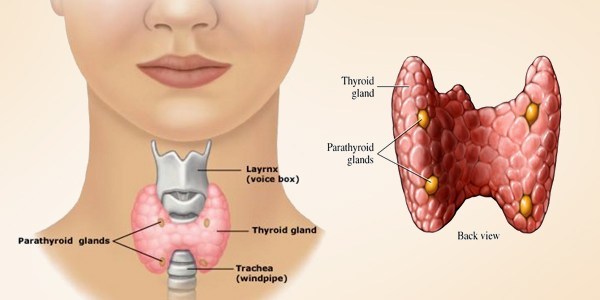Your thyroid is an essential gland in your body. Your thyroid is responsible for producing hormones that affect many processes in your body, like your heart rate and body temperature.
When your thyroid is functioning properly, you probably don’t give it another thought. But if it over or under-produces hormones, it can cause a lot of health issues.
Sometimes we don’t recognize low mood, fatigue, weight gain, or other problems as connected to our thyroid. But they can be! It’s important to know about thyroid function, thyroid location, thyroid disorders, and thyroid levels to understand what’s going on in your body and identify any thyroid problems.
An estimated 20 million Americans suffer from hypothyroidism and other thyroid disorders, and up to 60% of that number are unaware they have a thyroid issue.
Keep reading to learn more about your thyroid the symptoms of a thyroid disorder.
1. Thyroid Location
Your thyroid is a small butterfly-shaped gland that sits in your throat. It sits in front of your windpipe, just below your larynx.

Source: https://ronnyallan.net/2018/02/12/dont-be-underactive-with-your-thyroid-surveillance/
The thyroid is small and weighs less than an ounce, but it’s vital to our health.
2. Thyroid Functions
The thyroid converts iodine from the foods you eat into the thyroid hormones triiodothyronine (T3) and thyroxine (T4). These hormones help regulate everything from your metabolism to your body temperature.
Every cell in your body depends on your thyroid to produce hormones. Your thyroid can impact everything from blood flow to oxygen transport through your body.
3. Your Endocrine System
Your thyroid is part of your endocrine system: a series of glands that produce hormones that contribute to a wide range of bodily functions.
Your hypothalamus controls your pituitary gland, which, in turn, controls your thyroid glands. Your hypothalamus is the gland in your brain that produces thyroid-stimulating hormone (TSH). These are all part of your endocrine system.
Your pituitary gland sits at the base of your brain and communicates with your thyroid gland. Your endocrine system works as a team to keep you healthy and to keep your body functioning properly.
4. Hypothyroidism: What Is It?
Hypothyroidism, also called underactive thyroid, is a common problem that occurs when the thyroid doesn’t produce enough thyroid hormones.
Hypothyroidism symptoms include fatigue, weight gain, constipation, dry skin, irregular menstruation, joint and muscle pain, thinning hair, slow heartbeat, and depression.
An underactive thyroid can also affect your body temperature and make your extremities feel cold.
Many factors can cause hypothyroidism:
- Hashimoto’s disease, an autoimmune disorder where your immune system attacks your thyroid.
- Certain medications
- Congenital hypothyroidism
- Thyroiditis
- Surgical removal of part or all of the thyroid
- Radiation treatment of the thyroid
- A pituitary disease
- An imbalance of iodine in your diet
Luckily, hypothyroidism treatment is usually straightforward. There are medications that supplement the hormones your thyroid should be producing. With proper treatment and medication, hypothyroidism is very manageable.
5. Hyperthyroidism: What Is It?
While some people have an underactive thyroid, other people suffer from hyperthyroidism: an overactive thyroid. This is when your thyroid produces too many hormones too quickly.
Hyperthyroidism symptoms include fatigue, muscle weakness, rapid heartbeat, weight loss, diarrhea, trouble sleeping, nervousness, and irritability.
A variety of other issues can cause hyperthyroidism:
- Grave’s disease
- Thyroid nodules
- Thyroiditis
- Too much iodine
- Too much thyroid medicine—this can happen to patients taking medication for hypothyroidism
Mood swings and weight loss are two more common symptoms of hyperthyroidism. Oddly enough, treating an underactive thyroid may lead to an overactive thyroid if you don’t take the right amount of synthetic hormones.
Luckily, just like hypothyroidism, you can live a normal life with the correct treatment and medication.
6. Your Thyroid and Your Immune System
Hashimoto’s disease and Graves’ disease are autoimmune diseases that cause your immune system to attack your thyroid.
Hashimoto’s disease is a common cause of hypothyroidism and affects five out of every 100 Americans. Graves’ disease is a slightly less common disease that can cause hyperthyroidism. Approximately one of every 200 Americans suffers from Grave’s disease.
Hashimoto’s Disease and Graves’ disease are both manageable with identification and treatment. Know the signs of an overactive and underactive thyroid, and talk to your medical professional if you experience any of these symptoms.
7. Women Are More Likely to Have Thyroid Issues Than Men
Women are ten times more likely than men to suffer from hyperthyroidism and hypothyroidism. Thyroid cancer is 2.9 times more prevalent in women than in men.
Scientists have not yet found specific evidence as to why women are more affected by thyroid issues than men. However, women suffer from autoimmune diseases more often than men, leading to more thyroid problems.
Genetic, environmental, and lifestyle factors could be contributors. Thyroid conditions often cause menstruation problems, so your thyroid could be to blame if you experience irregular periods. Women can also suffer from postpartum thyroiditis after giving birth.
If you are a woman, make sure you know the signs of thyroid issues and speak to your doctor if you experience any symptoms. Remember, most thyroid problems are very treatable after correct identification.
8. Stress Can Affect Your Thyroid
Stress itself can’t cause thyroid problems. But, stress can exacerbate the problem if you already suffer from an autoimmune disorder or thyroid issue.
Stress can slow down your metabolism, which is one reason stress can cause weight gain. Because your metabolism and thyroid are so connected, high stress can negatively affect existing thyroid problems.
The good news is that you can work to manage your stress levels with proper self-care, and your thyroid will thank you.
9. A Healthy Diet Can Improve Thyroid Function
In some cases, you can improve your thyroid function with a healthy diet and lifestyle. Focusing on the right amount of iodine-rich food is important to supply your thyroid with the proper nutrients to function correctly.
Foods rich in iodine include dairy products, iodized salt, eggs, seaweed, and saltwater fish. Just remember not to overdo it.
Your body can become stressed without the proper nutrients, and this can contribute to low thyroid function. Feed your body nutritious foods, with a focus on fruits, vegetables, and whole grains. Avoid eating excessive amounts of saturated fats and simple carbohydrates.
Choose lean meat instead of red meat, and opt for whole-grain bread and pasta over white pasta. Your whole body will function more efficiently with the right nutrients, and your thyroid will function better with the right fuel.
10. Thyroid Conditions Can Be Lifelong but Very Manageable
While some thyroid conditions like postpartum thyroiditis are curable, hyperthyroidism, hypothyroidism, and other thyroid disorders are life-long conditions.
If you suspect you have a thyroid condition or have been diagnosed with a thyroid condition, don’t despair. While these are life-long conditions, they are very treatable.
Medical professionals typically use blood tests to diagnose thyroid issues. Once you have a diagnosis, your medical professional can prescribe medications to regulate your thyroid function and hormone production so that you can feel better.
Know Your Thyroid
The first step to treating a thyroid issue is identification. Once your medical professional diagnoses your thyroid issue, you can start treatment.
Many people live with thyroid conditions their whole life without a diagnosis. If you feel chronically fatigued, experience weight gain or loss, menstrual irregularity, muscle weakness, or any other symptom of thyroid disorders, speak to a medical professional as soon as possible.
Whether you have been diagnosed with a thyroid condition, or you suspect you have a thyroid condition, it’s essential to find the treatment plan that’s right for you.
At CityHealth Urgent Care, our team of medical professionals is here to help. CityHealth Urgent Care is fully equipped with a medical testing lab so you can get your results quickly and on-site.
Book a virtual visit to discuss symptoms, or come into our San Leandro or Oakland location for an in-person appointment.



